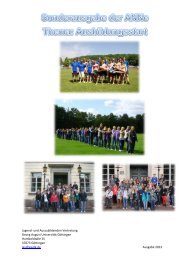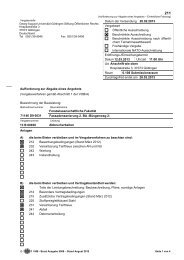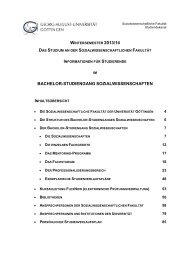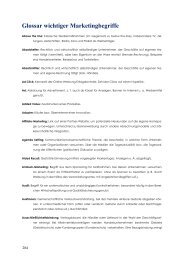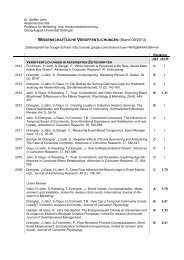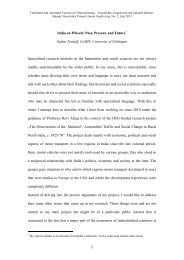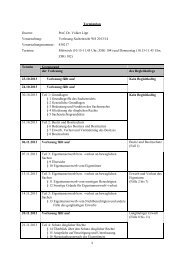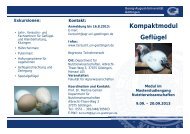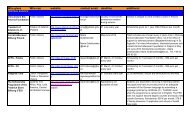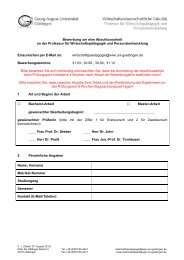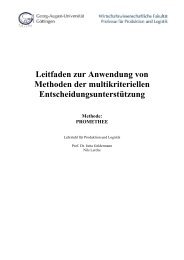CRC 990 - EFForTS - Georg-August-Universität Göttingen
CRC 990 - EFForTS - Georg-August-Universität Göttingen
CRC 990 - EFForTS - Georg-August-Universität Göttingen
Create successful ePaper yourself
Turn your PDF publications into a flip-book with our unique Google optimized e-Paper software.
<strong>CRC</strong> <strong>990</strong> Ecological and Socioeconomic Functions of Tropical Lowland Rainforest Transformation Systems (Sumatra, Indonesia) Issue 1 / <strong>August</strong> 2013<br />
page 28 von 32<br />
importance of hydraulic conductivity for tree growth<br />
performance.<br />
We conclude that (i) growth performance is strongly dependant<br />
on hydraulic conductivity; (ii) xylem anatomical<br />
patterns reflect species biogeographical origin and<br />
seem not to be modified due to habitat adaptation.<br />
Keywords: Tropical agroforestry, Theobroma cacao,<br />
shade trees, hydraulic conductivity, wood density,<br />
stem increment, perhumid climate, vessel<br />
diameter<br />
B06<br />
Title: Vascular epiphyte diversity in different transformation<br />
systems in Sumatra, Indonesia<br />
PRESENTER: Katja Rembold<br />
The worldwide loss and degradation of tropical rainforests<br />
caused by deforestation and transformation<br />
into agricultural land also affects epiphyte communities.<br />
Due to their arboreal habitat, epiphytes are very<br />
sensitive towards changes in microclimatic conditions,<br />
making them an excellent model group to study the<br />
consequences of land cover change. Therefore, we investigated<br />
the consequences of transformation from<br />
lowland rainforest into monocultures for vascular epiphyte<br />
diversity in Jambi Province (Sumatra, Indonesia).<br />
In total 90 study plots (20 x 20 m) were established in<br />
Bukit Duabelas National Park and surrounding oil palm<br />
and rubber plantations (30 plots per transformation system).<br />
Each plot contained one main phorophyte which<br />
was investigated for vascular epiphytes. Additionally<br />
all vascular epiphytes growing within a 2m zone above<br />
the base of each tree within the plot were recorded. We<br />
found a total of 54 epiphyte species belonging to 18 different<br />
families. While oil palm plantations contain the<br />
highest number of individuals (1806 individuals, 80%),<br />
forest plots had a much higher species diversity (45 species,<br />
83%) compared to oil palm and rubber plantations.<br />
Further, epiphyte communities in plantations showed<br />
higher rates of generalists while forest epiphyte communities<br />
are rather composed by specialists. Thus, even<br />
if epiphytes are very abundant in oil palm plantations,<br />
forest transformation clearly causes a loss of epiphyte<br />
diversity.<br />
Z02<br />
Title: DNA barcoding of vascular plants in Jambi,<br />
Indonesia<br />
PRESENTER: Fitri Yola<br />
DNA barcoding aims at providing a fast, accurate, and<br />
easily accessible species identification system. The use<br />
of DNA barcoding is of particular relevance for the identification<br />
of plants in highly diverse but endangered<br />
tropical systems such as in the forests of Indonesia which<br />
are facing great threats. This research is taking place in<br />
Jambi Province (Sumatra, Indonesia), where most of the<br />
original forest cover has been converted<br />
into oil palm and rubber plantations.<br />
We aim to sequence the DNA barcodes of<br />
vascular plant species in logged-over old growth forest<br />
and three different transformation systems (jungle rubber,<br />
rubber and oil palm plantations) and then combine<br />
it with classic morphological species identification to<br />
establish a barcoding system for vascular plants in the<br />
region and to make the data available for the scientific<br />
community via DNA barcoding databases. Together<br />
with specimen data and high quality photographs of<br />
fresh and dried plant material this information should<br />
speed up plant research in tropical transformation systems.<br />
Keywords: DNA barcoding, vascular plants, Jambi,<br />
barcoding database, transformation system.<br />
www.uni-goettingen.de/de/310995.html • crc<strong>990</strong>@gwdg.de • Telephone: +49 551 39-1 21 18<br />
JFB Institute for Zoology & Anthropology • Berliner Strasse 28 • D-37073 <strong>Göttingen</strong>




